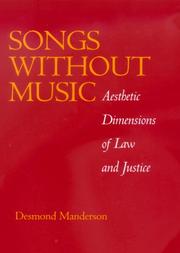| Listing 1 - 2 of 2 |
Sort by
|
Periodical
Abstract | Keywords | Export | Availability | Bookmark
 Loading...
Loading...Choose an application
- Reference Manager
- EndNote
- RefWorks (Direct export to RefWorks)
living law --- law history --- human rights --- juridical culture

ISBN: 128275873X 9786612758737 0520922212 1597349062 9780520922211 0585389837 9780585389837 9780520216884 0520216881 9781597349062 0520216881 9781282758735 6612758732 Year: 2000 Publisher: Berkeley, Calif. : University of California Press,
Abstract | Keywords | Export | Availability | Bookmark
 Loading...
Loading...Choose an application
- Reference Manager
- EndNote
- RefWorks (Direct export to RefWorks)
In this pathbreaking and provocative analysis of the aesthetics of law, the historian, legal theorist, and musician Desmond Manderson argues that by treating a text, legal or otherwise, as if it were merely a sequence of logical propositions, readers miss its formal and symbolic meanings. Creatively using music as a model, he demonstrates that law is not a sterile, rational structure, but a cultural form to be valued and enhanced through rhetoric and metaphors, form, images, and symbols. To further develop this argument, the book is divided into chapters, each of which is based on a different musical form. Law, for Manderson, should strive for neither coherence nor integrity. Rather, it is imperfectly realized, constantly reinterpreted, and always in flux. Songs without Music is written in an original, engaging, and often humorous style, and exhibits a deep knowledge of both law and music. It successfully traverses several disciplines and builds an original and persuasive argument for a legal aesthetic. The book will appeal to a broad readership in law, political theory, literary criticism, and cultural studies.
Law and aesthetics. --- Aesthetics and law --- Aesthetics --- aesthetics. --- argument. --- argumentation. --- composition. --- creative nonfiction. --- cultural studies. --- form. --- justice. --- law. --- legal argument. --- legal brief. --- legal interpretation. --- legal precedence. --- legal text. --- legal writing. --- literary criticism. --- living constitution. --- living law. --- metaphor. --- music theory. --- music. --- musical forms. --- narrative structure. --- narrative theory. --- nonfiction. --- philosophy. --- political theory. --- rhetoric. --- symbolism. --- text. --- writing.
| Listing 1 - 2 of 2 |
Sort by
|

 Search
Search Feedback
Feedback About UniCat
About UniCat  Help
Help News
News